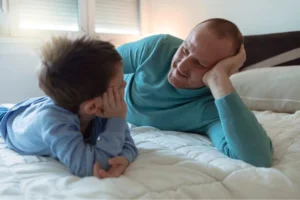
How To Explain LGBT Pronoun Usage To Your Kids
Learn how to address and answer your child’s questions about LGBT pronoun usage. Then, cultivate healthy conversations about how to equip your children to communicate using love, care, and compassion.
Urgent Need: As the back-to-school season begins, families are facing mounting pressure—tough choices, cultural confusion, and strained relationships.
Will you make a gift before August 31 to help provide Christ-centered support in this critical season?

What does sex education really do? I want my kids to be aware of certain topics that I think are important, but I don’t want them to be exposed to ideology I don’t agree with. How do I know where to start?
The effects of sex education and gender ideology on young children depends on the quality and main message. Does the message truly present trustworthy and scientifically based facts? Research shows that teaching young children about topics such as homosexuality and transgenderism has little to no measurable benefit for the child’s development.
However, sex education within the home directed by intentional and well-equipped parents is far more impactful. This is because of the foundational relationship between parents and children.
Here are some key questions to ask yourself on the topic of sex education:
For more information about how to begin and continue conversations about these topics with your kids, explore our sexuality and sex education resources.
Copyright © 2022 Focus on the Family. All Rights Reserved.





Focus on the Family Parenting includes the following programs: Adventures in Odyssey Club, PluggedIn.com, Clubhouse and Clubhouse Jr.

Learn how to address and answer your child’s questions about LGBT pronoun usage. Then, cultivate healthy conversations about how to equip your children to communicate using love, care, and compassion.

As our world continues to stray from God’s design for sexuality, it’s appropriate to wonder how we’ll convey that good design to our families.

Many of us cringe at the thought of ‘the talk.’ Whether we think back on our own experiences, reflect on our parents’ awkward style discuss the ‘birds and the bees,’